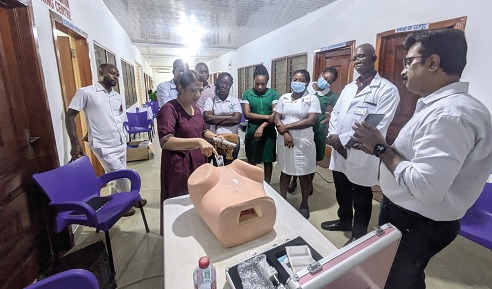A delegation from an Indian company, which is focused on revolutionising cervical cancer intervention, Periwinkle Technologies, has visited the Cervical Cancer Prevention and Training Centre (CCPTC) in the Catholic Hospital, Battor, to discuss how best they can partner for accelerated progress in cervical cancer testing and treatment.
The visit was to afford the delegation the chance to see at firsthand, the work being done by the CCPTC and how they could collaborate in their crusade against cervical cancer
It was also to introduce the CCPTC to the precancer device, a portable, AI-enabled screening device, the Smart Scope® CX, which the company has created and developed.
Periwinkle, made up of medical researchers, data scientists, business leaders, technocrats, medical professionals, and innovators, has come up with Smart Scope® CX, which provides real-time quick results.
During the meeting, officials from Periwinkle Technologies demonstrated to the staff of the CCPTC, how the device works.
Reducing mortality
Speaking on behalf of the delegation, the co-founder and Managing Director, Koustubh Naik, said the objective of the company was to revolutionise cervical cancer screening by using the latest technology to predict cancer.
“Using an easy-to-use patented screening device, we intend to make cervical cancer screening available to all.
“Once available at a testing centre, every female can get herself tested easily and regularly, thereby helping in early detection and intervention to save lives and reduce the over 300,000 global rate of cancer mortality,” Mr Naik said.
Technology critical
The Director of the CCPTC, Dr Kofi Effah, described as critical, the use of technology in the detection and fight against cervical cancer
He said it was amazing how technology was helping to revolutionise cervical cancer prevention.
“It is interesting that what we thought was science fiction some 10 to 12 years ago is happening right in front of our eyes, from mobile colposcopes which enable nurses to perform colposcopy in remote communities and in CHPS compounds, to portable thermal coagulators which also enable nurses to treat cervical precancer lesions in remote areas, technology is making an impact.
“These interventions do not require gases with large cylinders for cryotherapy.”
Indeed, today we have point-of-care HPV tests, such as 'pregnancy tests', being used and now, an AI-enabled cervical precancer screening with a portable device.
This task and crusade will be simpler and convenient for both healthcare givers and patients,”Dr Effah stated.
He, however, said it would be unfortunate and sad if these interventions were not made accessible to those who really need them.
“It will be sad if the settings around the world, including Ghana, that need these new technologies to reach out to as many women as possible to prevent cervical cancer do not take advantage of them,”Dr Effah stated.

